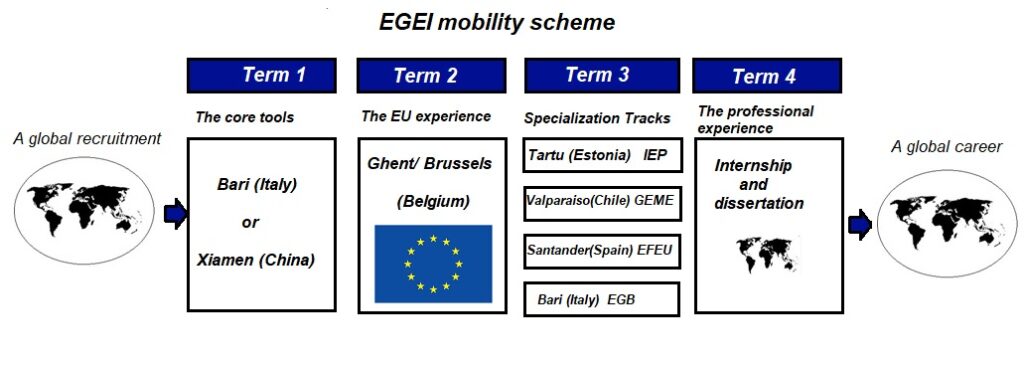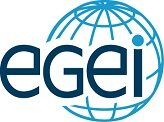The master’s programme has a workload of 120 ECTS credits, with a taught part consisting of 90 credits, an internship of 10 credits and a dissertation of 20 credits.
The study programme is full-time and runs over 24 months. It is taught by staff of the eight partner institutions and by high-profile visiting scholars. During the 2-years students move to at least three different universities in three different countries.
>>>>> Download here the leaflet of the programme for academic year 2025-26 <<<<<

- Note: the first term in 2025 will be hosted only by the University of Bari (Italy) / all students will be enrolled also at the University of Bari Aldo Moro (Italy), the Coordinating Institution of EGEI Consortium
First term at University of Bari (Italy)
Period: from September to December 2025 (30 Credits)
| Courses | Credits |
| • Advanced Microeconomics • Advanced Macroeconomics • Applied Econometrics I • International Trade • European Law and Institutions • Optional courses* [Mathematics for Economists / Italian Language] | 6 6 6 6 6 3 |
Second term at Ghent University and CEPS (Belgium)
Period: examinations and classes from January to July 2025 (30 Credits)
| Courses | Credits |
| • Economics of European Integration • Open Economy Macroeconomics / Economic Policy and Governance • Applied Econometrics II • Institutional Economics • Optional courses*: [Academic writing / Principles of Entrepreneurship / Dutch Language] | 9 9 6 6 3 |
Third term. Student can choose among four specialisation tracks offered at the following partners’ Universities
Period: from September to December 2025
| Track 1. Economics and Business of Globalisation (EBG) at the University of Bari Aldo Moro (Italy). (30 credits) |
| Courses: • Economics and Business of Multinational Organisations • Economics of Global Interactions • International Trade Law • International Development • Optional courses |
| Track 2. Economics and Financial Issues in the EU (EFEU) at the University of Cantabria, Santander (Spain). (30 credits) |
| Courses: • International banking and Finance • EU Economic Policy • EU Commercial Law • International Business: the EU perspective • Optional courses (5 credits) |
| Track 3. International Economic Policy (IEP) at Tartu University (Estonia). (30 credits) |
| Courses: • Trade Policy Analysis • International Management • Evaluation of Economic Policies • Selected Topics in Macroeconomics • Optional courses (5 credits) |
| Track 4. Globalisation and Emerging Market Economies (GEME) at Universidad Tecnica Federico Santa Maria, Valparaiso (Chile) (30 credits) |
| Courses: • Projections of Macroeconomic Variables • Business Oriented Microeconomics • International Finance • International Trade Agreements • Optional courses (5 credits) |
Fourth term. Individual mobility for professional specialisation
Period: from January to August 2026
• Internship (10 credits)
• Final dissertation (20 credits)
